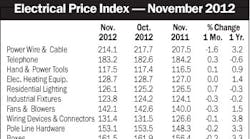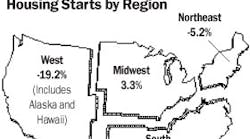Latest from Mag
People - Dec 21, 2012
Obituaries - Dec 21, 2012
November EPI Index Shows No Change
Housing Starts Dip 4% in November
Electrical Marketing - December 21, 2012
Around the Industry - Dec 21, 2012
Schneider Electric, Palatine, Ill., announced a win in its fight against electrical product counterfeiting. On December 7, 2011, Tamas Toldy, owner of Pioneer Breaker & Control Supply and Nick’s Sales, Austin, Texas, pleaded guilty in federal court to one count of mail fraud and one count of trafficking in counterfeit circuit breakers, following an investigation by U.S. Immigration and Customs Enforcement’s Homeland Security Investigations Directorate (ICE HSI).
Schneider Electric previously sued Toldy and Pioneer Breaker in Sept. 2007, alleging that Toldy and his company imported and sold counterfeit Square D brand goods in violation of the Lanham Act and other laws. In Feb. 2010, the parties entered into a settlement agreement to stop the flow of counterfeit goods through Toldy and Pioneer Breaker. Among other things, the parties entered into an Agreed Consent Order barring Toldy and Pioneer Breaker from importing and selling circuit breakers displaying counterfeit versions of trademarks registered to Square D. Toldy and Pioneer Breaker also agreed to limit the number of authentic Square D QO 2020 circuit breakers they sold for 10 years. Schneider Electric retained the right to inspect Pioneer Breaker’s inventory.
A few months after the consent order, in April 2010, ICE HSI Special Agents from Jacksonville, Fla., and Austin, Texas, executed a search warrant at Pioneer Breaker’s warehouse in Austin, Schneider said. Several Schneider Electric employees were present for the raid. The agents seized approximately 19,000 counterfeit electrical components and label-making equipment. ICE HSI special agents later searched a second warehouse in Laredo, Texas, and seized an additional 77,000 counterfeit circuit breakers mislabeled as Square D QO 2020s. ICE HSI estimates that the seized products had a manufacturer’s suggested retail price of $4.7 million.
Schneider Electric cooperated fully with the ICE HSI investigation and seizure, which directly led to criminal charges being brought against Toldy. According to the charges, Toldy devised and executed a scheme whereby he traveled to and met with manufacturers in the People’s Republic of China to hire them to copy and reproduce sample circuit breakers produced in the United States. Toldy also was alleged to have affixed labels bearing a counterfeit UL trademark, and then used his companies to market and sell the counterfeit goods as legitimate products manufactured by the trademark holders and tested by Underwriters Laboratories, Schneider said.
Toldy will be sentenced by the United States District Court for the Middle District of Florida in April 2012.
The resolution of this case comes at a time when Schneider is ramping-up its anti-counterfeiting efforts and offering a reward for assistance in identifying and prosecuting counterfeiters. The company introduced a new “Report and Reward” program this week that seeks to gain information about manufacturers and distributors of counterfeit Schneider Electric products, producers of counterfeit packaging and labels and facilities storing counterfeit products, packaging or labels. Counterfeit reports in full detail are eligible for a reward; anonymous tips would not be eligible for a reward.
“We are concerned about the counterfeiting of electrical products globally. Counterfeit products have a negative impact on the economy, mislead the consumer and, in the case of electrical products, have the ability to kill or injure someone or cause damage to property,” said Stephen A. Litchfield, deputy general counsel for Schneider Electric. “This program is designed to ensure we have the information we need to pursue every means possible to stop this illegal activity and to make the industry and public more aware of this critical safety concern.”
Schneider said its anti-counterfeiting efforts to date have kept more than 250,000 potentially hazardous counterfeit goods out of the marketplace and have led to 13 civil lawsuits against 40 companies involved in the manufacture, importing and distribution of counterfeit electrical products.

